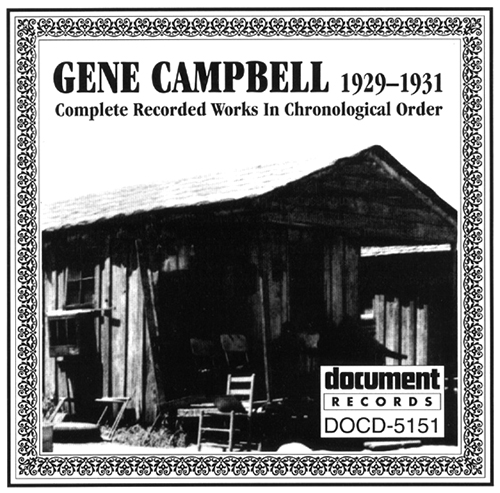
Abridged from this album’s original booklet notes. Gene Campbell remains a complete biographical cipher. The few people who have written about Campbell suggested that Texas was his home or that he spent part of his adult life there. In Western Plain Blues (C-5708) he describes himself as “born in Texas, raised in Texas, too”. More specifically, it would seem that East or Central Texas was his residence during the 1920s. This supposition is underscored by the fact that he recorded at Dallas, Texas, field sessions held in late 1929 and again one year later. At the first session, he was in the same company as such known Texan’s as Blind Norris and Sammy Price. I also think that his references in Levee Camp Man Blues (C-5707-A) to working with mules on the levee, while pan-Southern, are more likely to have occurred in eastern or central Texas where such construction was more commonplace along the Red, Sabine, or Trinity Rivers. Several of his songs, such as Don’t Leave Me Blue Blues (DAL-6789-A) contain references to other cities (Waco, Fort Worth and San Antonio) in eastern and central Texas. His voice has some of the relaxed qualities – an expressive, though easy drawl – that one hears on the recordings of Willard “Rambling” Thomas and Jesse Thomas, for example. These two men worked around the Ar-La-Tex (the tristate area where Arkansas. Louisiana, and Texas meet), meandering as far west as Dallas. Campbell’s vocal inflections are restricted in their range, almost always less than an octave, and his diction is unusually clear. In addition, his penchant for descending vocal phrases calls Dennis “Little Hat” Jones to mind. Campbell’s picking is also reminiscent of other Texas players; his arrpegiated breaks remind me of Blind Lemon Jefferson, though he lacks Jefferson’s technical facility. His technical ability to provide a moderately interesting chordal accompaniment is heard to good advantage on Doggone Mean Blues (DAL-6790-A). His guitar phrasing the short, rhythmic, breaks on Main Papa’s Blues (C-72520-A), for instance], also recalls the work of King Solomon Hill, who lived just east of Shreveport, Louisiana, not far from the Texas border. Like so many bluesmen of the late 1920s, Campbell listened closely to the recordings of Lonnie Johnson. He emulates some of Johnson’s musical ideas, particularly the way he strongly attacks guitar phrases at the very beginning of instrumental breaks. Clifford Gibson is another non-Texas bluesman who comes to mind when listening to Campbell. His voice has some of Gibson’s mannerisms, though it is less nasal; he also lacks Gibson’s ability to turn a pithy or ironic phrase, though Gene Campbell almost succeeds with lines such as:
Going to find my baby, she’s got to meet me face-to-face (x2) And tell me why she let another man take my place.
In short, Gene Campbell seems to have absorbed influences from many sources. Some of them are no doubt from other local, almost certainly unknown bluesmen, whom Campbell met during his ramblings. Campbell was also part of the larger east/central Texas scene from which many of my comparisons are drawn. Finally, there are the clear inspiration from phonograph records by several artists, most notably the unambiguous Jimmy Rodgers‘ mannerisms on Freight Train Yodeling Blues – Parts 1 & 2 (C-5709/10). You mix these together with Gene Campbell‘s own creative impulses and you have a regional bluesman of the second tier, whose interesting records are illustrative of his musical times and cultural milieu. DOCD-5151
Tracklist :
1 Mama, You Don't Mean Me No Good No How 2:58
2 Bended Knee Blues 2:55
3 Wandering Blues 2:41
4 Somebody's Been Playin' Papa 3:02
5 Wash And Iron Woman Blues 2:15
6 Robbin' And Stealin' Blues 2:42
7 I Wish I Could Die 2:51
8 Lazy Woman Blues 2:50
9 Levee Camp Man Blues 3:09
10 Western Plain Blues 2:43
11 Freight Train Yodeling Blues – Part 1 2:38
12 Freight Train Yodeling Blues – Part 2 2:58
13 Don't Leave Me Blue Blues 2:31
14 Doggone Mean Blues 2:38
15 Married Life Blues 2:30
16 Fair Weather Woman Blues 2:26
17 Lonesome Nights Blues 2:38
18 Wedding Day Blues 2:26
19 Main Papa's Blues 3:02
20 Face To Face Blues 3:07
21 Crooked Woman Blues 2:41
22 Overalls Papa Blues 3:10
Mostrando postagens com marcador Gene Campbell. Mostrar todas as postagens
Mostrando postagens com marcador Gene Campbell. Mostrar todas as postagens
2.2.25
GENE CAMPBELL — Complete Recorded Works In Chronological Order 1929-1931 | DOCD-5151 (1993) RM | FLAC (tracks+.cue), lossless
Assinar:
Comentários (Atom)
+ last month
MARTHA COPELAND — Complete Recorded Works In Chronological Order Volume 2 · 1927-1928 + IRENE SCRUGGS — The Remaining Titles 1926-1930 | DOCD-5373 (1995) FLAC (tracks+.cue), lossless
One of many early blues and jazz women who were overshadowed and ultimately eclipsed by Ma Rainey, Ethel Waters, and Bessie Smith, Martha Co...





.jpg)
.jpg)



